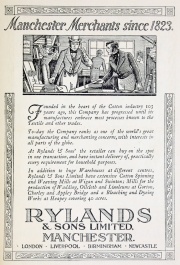Rylands and Sons of Faulkner Street, Manchester and other addresses; of Manchester and Wigan.
1823 Company established by John Rylands.
1873 The company was registered on 25 October, to take over the business of the firm of the name as manufacturers and general warehousemen. [1]
1880s Reported to have built a few steam locomotives.[2]
1884 Installed a horizontal cross-compound engine by W. Sharples and Co at their Dacca Twist Mill, Water Street, Manchester. Cylinders 22" and 38" diameter, 5 ft stroke. Gear drive, the spur flywheel being 12 ft 8" diameter and 16" wide, the pinion 5 ft 7" diameter. The teeth were cast, not machined, but were said to run 'almost noiselessly'.[3]
1888 An obituary of John Rylands noted that he 'occupied pretty nearly the whole of New High- street and Bread street, to say nothing of his large warehouse in Wood-street, Cheapside, London, and the great manufacturing works at Gorton, and at Ainsworth, near Bolton. To these were after- wards added the Longford Mills, Oxford-street, Chorlton-on-Medlock; the Dacca Mills in Water- street; the Medlock Mills in South Junction-street; the Gidlow Works at Wigan; the Mather-street Mills in Bolton; the mills at Swinton and Walkden Moor; the Cluster-street Mills and Longford Works at Crewe; the Heapey Bleach and Dye Works, near Chorley; and extensive branches in London and Liverpool. His Mianchester warehouses now occupy most parts of New High-street and Bread- street, and considerable sites in Tib-street, Bridgewater-place; Joiner-street, and Market-street.'[4]
1891 Gidlow Works, Wigan; printers, shirtings and domestics; and at Gorton Mills, Manchester. Pay days Tuesday and Friday at 25, Faulkner street, Manchester. Telegrams, "Rylands, Wigan."
1891 Directory: Listed as Cotton Spinners and Manufacturers. More details
1924 Acquired Thomas Witter and Co.
1960 Acquired Hickson, Lloyd and King.[5]
Note: Manchester's impressive John Rylands Library, which opened to the public in 1900, was founded by Enriqueta Augustina Rylands in memory of her husband, John Rylands [6]




